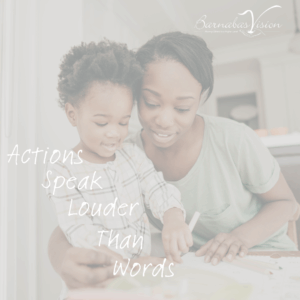 Are you inadvertently derailing your child’s self-esteem?
Are you inadvertently derailing your child’s self-esteem?
“Children are not a distraction from more important work. They are the most important work.”
In our previous article, Actions Speak Louder than Words Part 1, we looked at two parenting tools which build children’s self-esteem through simple, daily interaction. By basing our conversations about “self-worth” on God’s truth—that our identity is in Christ as God’s children—we flip the worldly perspective that worth must be earned. We dispel the false belief that our value in society is based on external things like appearance, performance, behavior, status, or popularity. “Self-worth” isn’t based on ourselves, but on our identity as a member of God’s family. Along with that truth, we looked at the importance of spending quality time engaging with our kids, because humans invest time (our most valuable resource) in what we care about. Spending time with our kids says, “I care about you. You matter,” louder than any spoken word could.
Next, we’ll look at one more tool to defend against the thief who steals our kids’ self-esteem right out from under our noses. But this wolf doesn’t hide in sheep’s clothing; it hides in the shepherds’.
Well-intentioned parents often send their kids messages of discouragement without realizing it by doing too much for them. We do this because we care. We’re wired to nurture and care for our kids. But there’s a balance. Not letting kids do something they could accomplish alone expresses a vote of no confidence. Allowing kids to do age-appropriate things for themselves is vital to their development. When caregiving morphs into helicopter parenting, aka doing too much for too long, it’s hard to spot, because it’s what we’ve always done. But deep down, children desire independence and are capable of doing most “life things” for themselves. When parents do for their kids what kids could do for themselves, it sends the message that we don’t trust them to accomplish the task at hand.
Dr. Maria Montessori observed that adults who do for children what children are capable of doing for themselves become an impediment to their growth.
“The child realises that through his own efforts he can be independent and achieve things he has set his mind to. And gradually we educators are confronted with a simple but important fact: that to help the child is not what he needs, and indeed that to give help is an impediment for the child.”
-Dr. Maria Montessori, Citizen of the World
Teaching children age-appropriate life tasks and household chores, and then trusting them to do them, is a fantastic self-esteem/confidence booster in your parental tool belt. When preschoolers dress themselves, they feel a great sense of accomplishment. When elementary children prepare food, feed pets, or sweep floors, they care for themselves and their home, filling a valuable family role. Children long for important work.
Tool # 3. Trust
Trust is our third tool. As children learn life skills, they gain independence. Independence instills confidence and a sense of self-worth. Every time a parent allows a kid to accomplish a task on their own, the child hears the message, “You’re capable and I trust you.”
Parents, our goal should be to work ourselves out of the parenting “job” to let our children gain the independence they need to not only survive, but thrive once they are out on their own.
When our middle school child came down the stairs one morning and announced she couldn’t wear a certain thing because she forgot to do her laundry, I knew we were there. Kids who do chores learn confidence and personal accountability. A middle schooler doesn’t complain about the lunch he packed himself. A teen doesn’t gripe about a shirt she shrank in the dryer.
But there are challenges intrinsic to this approach. Teaching takes time we think we don’t have. But spending our time teaching kids to do laundry, change oil, make appointments, or cook a meal fosters self-worth born from knowing they’re valued and trusted to handle important things.
And when we trust anyone with anything we care about, especially someone learning a new skill, they’re bound to mess up. Kids will not get everything right from the get-go. We must build grace and room for error into the process. When teaching our kids to handwash a china teacup, we probably shouldn’t start with our grandmother’s antique set.
A child learning to do dishes may stop up the sink. A kid learning to drive might back over the mailbox. Teens learning to navigate friend drama will inevitably make some mistakes and possibly some enemies. Some mistakes will be small. Some will feel insanely huge. But here we encounter the second (and most) important part of this life lesson. When they break the dish, clog the pipe, or do the thing that hurts a heart, we meet them with grace, a mop, and a hug of forgiveness and let them know we’ve all made mistakes and had to clean up the mess. None of us is perfect. And our worth doesn’t depend on performance or perfection. It’s a gift from our holy, loving Father.
Kids notice when we invest our most valuable resource, time, to teach them God’s truth and how to “do life” according to that truth. They will notice when we trust them and offer that vote of confidence, that we believe they can handle this life and do it well. Most importantly, they’ll learn that when they make a mistake, we are here for them, and that their value in our eyes—their true worth—hasn’t diminished a bit, because it never depended on them to begin with.
– Elisabeth Gay
